A sample text widget
Etiam pulvinar consectetur dolor sed malesuada. Ut convallis
euismod dolor nec pretium. Nunc ut tristique massa.
Nam sodales mi vitae dolor ullamcorper et vulputate enim accumsan.
Morbi orci magna, tincidunt vitae molestie nec, molestie at mi. Nulla nulla lorem,
suscipit in posuere in, interdum non magna.
|
We are delighted to announce the publication of a volume of studies which has just appeared with Brill: The Languages of Early Medieval Charters: Latin, Germanic Vernaculars, and the Written Word. Featuring 14 chapters from 15 contributors, this book represents the first major study of the interplay between Latin and Germanic vernaculars in early medieval records. These studies are the fruits of conference panels held at the Leeds International Medieval Congress and the Kalamazoo International Congress on Medieval Studies, and a cycle of lectures held in Vitoria-Gasteiz at the University of the Basque Country. The book brings together exciting new research from a wide range of scholars, from early career researchers to established leading experts, working on such topics as literacy, historical linguistics, multilingualism, communication, administrative practices, legal cultures and more. Almost five years in the making, this volume represents the primary outcome of our project and we are thrilled that it is now available to readers.
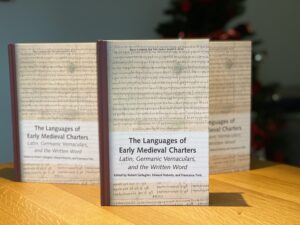
Much like our overall project, The Languages of Early Medieval Charters volume seeks to foreground the question of language choice in the documentary practices of early medieval western Europe. Specifically, it examines the interaction between Latin and Germanic vernaculars in the Anglo-Saxon and eastern Frankish worlds and in neighbouring areas. Unlike in Romance-speaking regions, there was a far greater gap between the written word and spoken language in these Germanic-speaking societies, where Latin had to be learned as a second language. This bilingualism has largely been taken for granted, while charters have been neglected in studies of early medieval vernaculars. In fact, multilingual and vernacular documents from Anglo-Saxon England and Carolingian Francia enable us to pose questions about literacy, identity, the relationship between written and oral communication, language choice and code-switching that are not so easily asked of Romance-speaking regions of Europe.
This book thus brings together pioneering studies in the hitherto overlooked role of language in the production and use of early medieval records. Chapters examine various different dimensions to this expansive theme. For example, Annina Seiler analyses the orthography of both Anglo-Saxon and Alemannic charters; Bernhard Zeller examines the formulation and language of St Gall charters; Stefan Esders considers vernacular registers from tenth-century Saxony; Charles Insley interrogates the linguistic complexities of Cornish charters; Marco Stoffella traces the appearance of Lombardic in charters from northern Italy; and Rory Naismith brings charters and coinage into dialogue for understanding literacy ‘in action’ in Anglo-Saxon England.
Chapters are further underpinned by an important comparative dimension. As Francesca Tinti makes clear in the volume introduction, Anglo-Saxon and Frankish documentary cultures offer a particularly attractive case for comparison on account of the regions’ shared Germanic linguistic heritage and the maintenance of numerous cross-channel links throughout the early Middle Ages. However, these studies show that the written vernacular was invoked in different ways in these lands. In Anglo-Saxon England, Old English played an important role in administrative practice and literary culture from an early date. By contrast, Old High German and Old Saxon, though increasingly attested as ‘literary’ languages in this period, were used sparingly in administrative contexts on the Continent. These divergent linguistic situations have been noted but seldom explored in their own right. Our book moves these issues to centre stage and, in doing so, provides fresh interpretations of well-known sources as well as compelling evaluations of more obscure texts, in order to cast important new light on the relationship between the written and the spoken word in early medieval Europe.
The methodological approaches showcased within these chapters demonstrate not only the fundamental importance of charters and related evidence, but also the rich value of comparative approaches to historical enquiry. As such, it is hoped that this volume will become a valuable point of reference for both specialist researchers and students engaged with questions of medieval literacy, multilingualism, communication, and the uses of the written word. These are topics which, over the past thirty years, have been subjected to intense scrutiny and fascination, fundamental as they are to our approaches to the primary sources on which our understanding of past societies is built. The chapters within this volume, furthermore, make important contributions to related social, cultural and political issues such as identity, performance and technology, which are also subjects of vibrant scholarly debate. We are pleased to have found the book a natural home in Brill’s Series on the Early Middle Ages, which has a distinguished history of publishing interdisciplinary works with particular strengths in communication, diplomatics and identity. We would like to thank the editors at Brill for their support, as well as all of our contributors for making this such an exciting, dynamic volume.
Finally, we are pleased to say that the book is currently available for purchase with a 25% discount, available until 31 December 2021. Place orders at brill.com quoting discount code 72100.
List of Chapters in The Languages of Early Medieval Charters: Latin, Germanic Vernaculars, and the Written Word, ed. Robert Gallagher, Edward Roberts, and Francesca Tinti (Brill: Leiden, 2021):
- Latin and Germanic Vernaculars in Early Medieval Documentary Cultures: Towards a Multidisciplinary Comparative Approach
Francesca Tinti
- Charters, Languages, and Communication: Recent Work on Early Medieval Literacy
Rosamond McKitterick
- The Multilingualism of the Early Middle Ages: Evidence from Peripheral Regions of the Regnum orientalium Francorum
Wolfgang Haubrichs
- Germanic Names, Vernacular Sounds, and Latin Spellings in Early Anglo-Saxon and Alemannic Charters
Annina Seiler
- Language, Formulae, and Carolingian Reforms: The Case of the Alemannic Charters from St Gall
Bernhard Zeller
- Signalling Language Choice in Anglo-Saxon and Frankish Charters, c.700-c.900
Edward Roberts and Francesca Tinti
- The Endorsement Practices of Early Medieval England
Robert Gallagher and Kate Wiles
- Traces of Bilingualism in Early Medieval Northern Italy: The Evidence from Eighth- and Ninth-Century Private Charters
Marco Stoffella
- Languages of Boundaries and Boundaries of Language in Cornish Charters
Charles Insley
- Vernacular Writing in Early Medieval Manorial Administration: Two Tenth-Century Registers from Werden and Essen
Stefan Esders
- Royal Authority, Regional Integrity: The Function and Use of Anglo-Saxon Writ Formulae
Albert Fenton
- From Memorandum to Written Record: Function and Formality in Old English Non-Literary Texts
Kathryn A. Lowe
- Writing, Communication, and Currency: Dialogues between Coinage and Charters in Anglo-Saxon England
Rory Naismith
- Epilogue
Janet L. Nelson
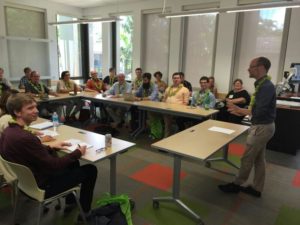
This summer the LEMC project had the opportunity to present some of its findings at the International Society of Anglo-Saxonists, a biennial gathering of scholars from across the world who research early medieval England, its literatures, languages, histories and legacies. This year’s conference took place in the unique surroundings of the University of Hawai’i at Mānoa, Honolulu, a space that provoked much reflective discussion on the state of the fields of Anglo-Saxon and Medieval Studies and which provided the project with much enthusiastic and informative engagement. The project organised a single session for the conference in which its three speakers sought to explore Anglo-Saxon charters within comparative geographic and interdisciplinary dimensions. The session comprised papers from project members Robert Gallagher and Francesca Tinti, as well as a paper from long-standing friend of the project, Professor Simon Keynes of the University of Cambridge. Robert discussed recent work he has undertaken into the world of ‘private’ charters (i.e. documents issued on behalf of individuals other than the king) and he drew attention to evidence that suggests that such documents were at many centres normally written in Old English in the tenth and eleventh centuries. The evidence thus points towards contexts in which Latin was often upheld as the exclusive language of royal diplomas and, as such, it offers productive contrasts with contemporary documentary activity in neighbouring Francia. Francesca provided a survey of the linguistic complexities of material from late Anglo-Saxon Worcester and demonstrated how tantalising parallels could be drawn with a unique stone inscription from contemporary York; by doing so, Francesca explored how the institutional connections between Worcester and York could provide channels for the nurturing of particular literary and linguistic practices. Simon closed the session with a masterful survey of the place of seals and other associated artefacts in Anglo-Saxon diplomatic, social and political history. Collectively, we aimed to show the huge value and potential that Anglo-Saxon charters hold for many lines of intellectual enquiry. We are extremely grateful to Dr Peter Stokes for chairing our session and to all those who attended and participated in what was an extremely fruitful discussion. Moreover, we’d like to thank Professor Karen Jolly and the other members of the conference committee for organising what will no doubt be seen for years to come as a landmark conference – a meeting during which scholars engaged positively and productively with many of the issues that we must face within modern academia and society.

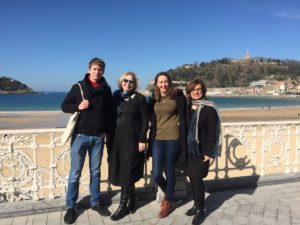
On 15 and 16 February the Languages of Early Medieval Charters team was delighted to welcome Dr Kathryn Lowe from the University of Glasgow to the Basque Country for a stimulating and wide-ranging two-day workshop. Dr Lowe has been at the forefront of research on Anglo-Saxon documentary culture for over twenty years now. Dr Lowe’s expertise focuses on vernacular written records, their uses and their transmission, and her work on wills, chirographs and bounds has been particularly influential on the shaping of the Languages of Early Medieval Charters project. The team were therefore thrilled to hear about Dr Lowe’s current work on the functions and forms of Old English documents, much of which has stemmed from her editing of the Anglo-Saxon charters from Bury St Edmunds with Professor Sarah Foot of the University of Oxford. Dr Lowe guided the project team through a number of case studies, some of which contained highly unusual orthography and Old Norse-derived vocabulary, and some of which were likely to have survived thanks to multiple stages of copying. The story that this material told was two-fold. On the one hand, it attests to the fascinating social dynamics of East Anglia in the centuries immediately before and after the Norman Conquest: a place where the linguistic and cultural footprints of Scandinavian settlers could be detected in a miscellaneous body of vernacular records. At the same time, this material offers a reminder of the pitfalls of approaching documents with rigid views concerning typologies and form. Several of these pre-Conquest records are not currently included within the catalogue of Anglo-Saxon charters established by Peter Sawyer, and their value to medieval copyists has seemingly been underestimated by modern scholars, perhaps largely due to the manner in which they have survived. This was a compelling and problematizing lesson that could uniquely be taught with Dr Lowe’s philological and palaeographic expertise.
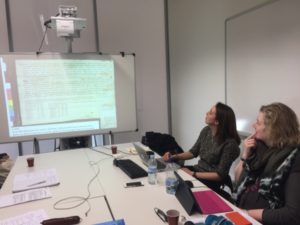
In turn, members of the project presented to Dr Lowe several aspects of our current research. Dr Kate Wiles provided an overview of her work on the development of bounds within the corpus of Anglo-Saxon charters, which offers a complex bilingual context to Dr Lowe’s seminal work on vernacular boundary clauses. Dr Robert Gallagher presented his recent findings regarding the Latin charters of tenth- and eleventh-century England that were issued on behalf of individuals other than kings. Kate and Robert then offered a sneak preview of their new investigation into the endorsement practices of Anglo-Saxon documentary culture. In addition, the project team and Dr Lowe explored our under-construction database of the languages of Anglo-Saxon charters.
To boot, the workshop was punctuated with some of the best gastronomic delights and sunshine that San Sebastián has to offer. We’d like to thank Dr Lowe for taking the time to join us for this workshop!
The project is thrilled to be hosting four sessions at the forthcoming International Medieval Congress at the University of Leeds. We’re bringing together twelve speakers from France, Germany, Italy, Spain, Switzerland and the UK to discuss languages and literacy across the early medieval West, in what promises to be an exciting day of collaboration and discussion. All of our sessions will be on Tuesday 5 July in the Parkinson Building, room 1.08. Please join us if you can! Our schedule is as follows:
Session 512: 09.00–10.30
- Wolfgang Haubrichs, ‘Carolingian Old High German Texts Embedded in Multilingual Situations: OHG Isidor, Straßburg Oaths, Ludwigslied, Pariser Gespräche, Kassel Glosses‘
- Jens Schneider, ‘Questions on Carolingian Vernacular Legislation’
- Stefan Esders, ‘Writing Old Saxon in Early Medieval Manorial Administration: The Cases of Werden and Essen’
Session 612: 11.15–12.45
- Olga Timofeeva, ‘Anglo-Latin Bilingualism before 1066: Going beyond Limitations’
- Aya van Renterghem, ‘Another Day, Another Alphabet: Bilingualism in Runica Manuscripta’
- Rory Naismith, ‘The Languages of Money in Early Medieval England and Its Neighbours’
Session 712: 14.15–15.45
- Marco Stoffella, ‘Traces of Bilingualism in Early Medieval Northern Italy: The Evidence from Private Charters, 8th-10th Centuries’
- Edward Roberts, ‘The Use of the Vernacular in Fulda and Freising Charters, c. 770 – c. 900’
- Hans-Werner Goetz, ‘Germanic Names in Latin Charters: Reflections on the Saint-Gall Charters’
Session 812: 16.30–1800
- Robert Gallagher, ‘Constructing Authority in Anglo-Saxon ‘Private’ Charters’
- Albert Fenton, ‘The Linguistic Features and Formulae of Anglo-Saxon Writs’
- Charles Insley, ‘Languages of Boundaries and Boundaries of Language in Cornish Charters, 900-1100’
The project will be hosting two sessions at this week’s International Congress on Medieval Studies at Western Michigan University, Kalamazoo. Three members of the team will be presenting some of our findings, while we’re also delighted to be hearing from three other researchers who are tackling the question of multilingualism in Anglo-Saxon England. The two sessions will be taking place on Friday afternoon at 1.30pm and 3.30pm in Schneider 1265. Please join us if you can! Our programme is as follows:
1.30pm:
Francesca Tinti, Univ. of the Basque Country, ‘Latin and Vernacular in Early Medieval Charters: From Anglo-Saxon England to Eastern Francia’
Robert Gallagher, Univ. of the Basque Country, ‘Language Choice in Anglo-Saxon Charters: Production, Use and Participants’
Edward Roberts, Univ. of the Basque Country/Univ. of Liverpool, ‘Old High German in East Frankish Charters: Pragmatic Literacy or Bilingualism?’
3.30pm:
Rachel Hanks, Univ. of Notre Dame, ‘Ghosts of Latin in the Vernacular: Bilingualism and the Meter of The Riming Poem’
Audrey Walton, Univ. of Toronto, ‘Anthologizing across Linguistic Divides: The Exeter Book and Cambridge GG 5.35’
Courtnay Konshuh, Univ. of Winchester, ‘Translating the Anglo-Saxon Chronicles into Latin: Asser and Aethelweard’
Tomorrow, Robert Gallagher will be speaking about some of his work on the project in a lecture on ‘The Vernacular in Anglo-Saxon Charters: Expansion and Innovation in Ninth-Century England’. This will be held at the ASNC Research Seminar at 5pm tomorrow (22 April) in GR/05 in the English Faculty, University of Cambridge.
Yesterday the team was visited by Dr Bernhard Zeller (Vienna), who delivered a fascinating talk on the languages of the charters of St Gall, a monastery in present-day Switzerland which preserves one of the richest documentary collections from the early medieval period – over 800 original single-sheet charters from before the year 1000. Dr Zeller has been editing the ninth-century St Gall charters for the Chartae Latinae Antiquiores over the course of the last decade, and this week he shared with us his thoughts on several linguistic aspects of the collection. The St Gall archive is particularly interesting from a linguistic perspective, as it preserves charters from both the Germanic- (Alemannic-) speaking area around St Gall and the southerly Romance-speaking region of Rhaetia. Dr Zeller explored the Latinity of these charters and surveyed how an initially rustic Latin evolved over the course of the late eighth and early ninth century as monastic scribes increasingly came to monopolise the drafting of documents and Carolingian Latin reform began to take root. Traces of the Germanic vernacular can also be spotted in these charters, and Bernhard outlined several important contexts for its occasional use.
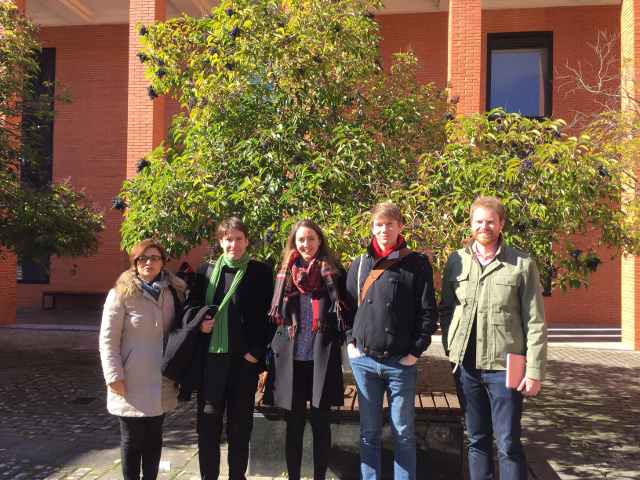
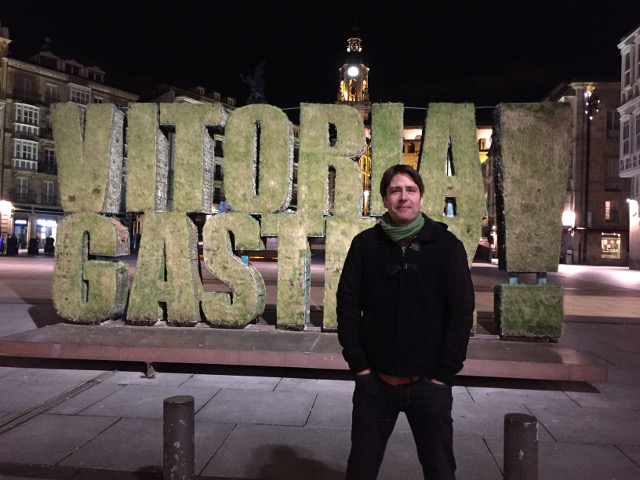
Yesterday, Professor Dame Jinty Nelson (London) delivered a lecture in Vitoria on ‘Language-use in Charlemagne’s Empire’. Professor Nelson selected three ‘postcards’ from the Frankish empire under Charlemagne, each of which illustrates how vernacular language could be harnessed and deployed to great effect – a royal diploma enacting a new political relationship between Charlemagne and the quasi-independent Rhaetian bishopric of Chur through its use of the Frankish term mundoburdum (broadly, ‘protection’); a Freising charter containing a Bavarian count’s assertion of his identity and local standing through a vernacular statement of the boundaries of his land, which had earlier been seized by Charlemagne’s men; and a letter from a formulary collection preserving a woman’s plea to Charlemagne to protect her, in which she used a rare vernacularized verb, munburire, at root of which was the same sense of royal protection in the diploma for the bishop of Chur. Professor Nelson stressed that in each case, language choice was not accidental – the actors in these documents made their statements and appeals through conscious use of Germanic (or Franconian) words and phrases. The textualization of the vernacular thus conveyed meanings and identities which even the most ‘correct’ Latin could not impart.
Watch a video of the talk here.
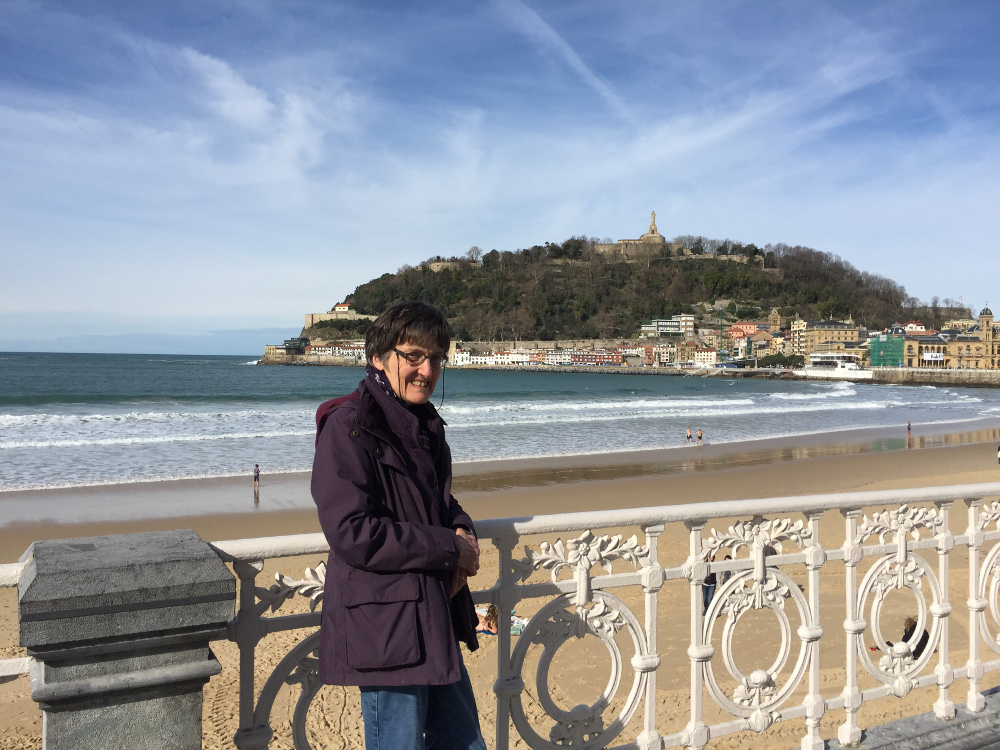
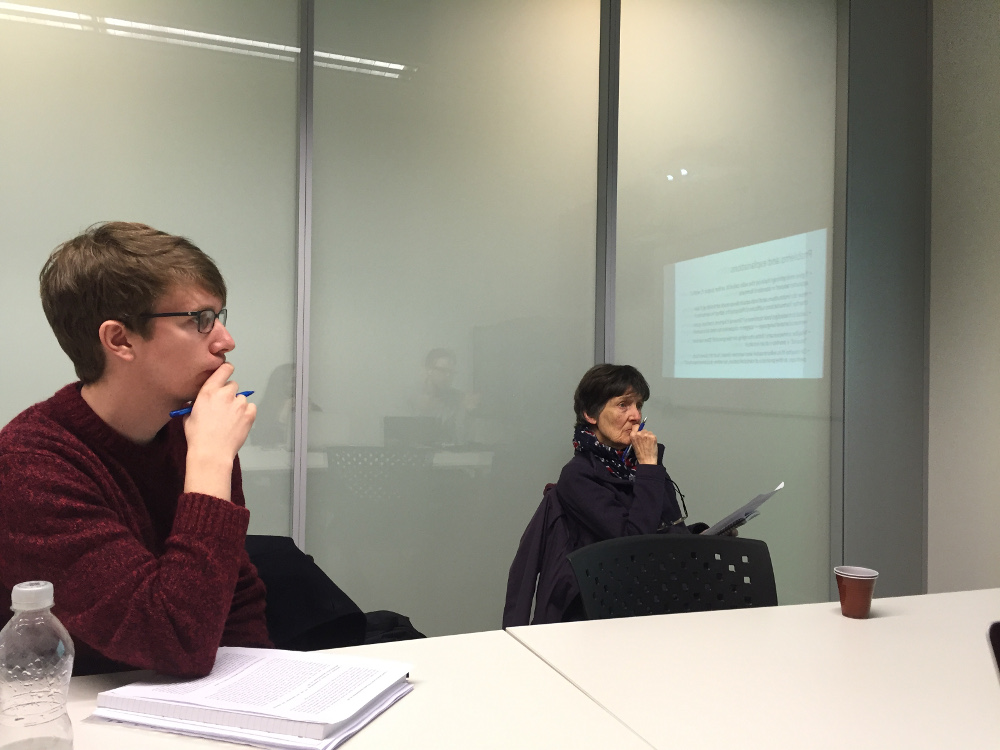
Next week, the project welcomes Dr Bernhard Zeller (Vienna) to speak on ‘The Languages of the Early Medieval Charters of St Gall’ (Wednesday 17 Feb., 11am, Aulario de Las Nieves, Aula 207).
Last week, Dr Charles Insley (University of Manchester) came to Vitoria to speak to us on ‘Languages of Boundaries and Boundaries of Languages in Cornish Charters, 900-1100’, in which he analysed language-use in a small collection of Anglo-Saxon charters for the region of Cornwall (southwest England). These documents are marked by traces of the Brittonic Old Cornish vernacular, usually in the form of place-names in charter boundary clauses. However, there is in fact a good deal of variety in these boundary descriptions – some are written mostly in Latin, while in others the Old English vernacular is prevalent. Dr Insley thus explored the implications of these language choices for our understanding of multilingualism in early medieval Cornwall. Given that vernacular descriptions of land and boundaries form a central part of our project, Dr Insley offered us a valuable and fascinating comparative perspective.
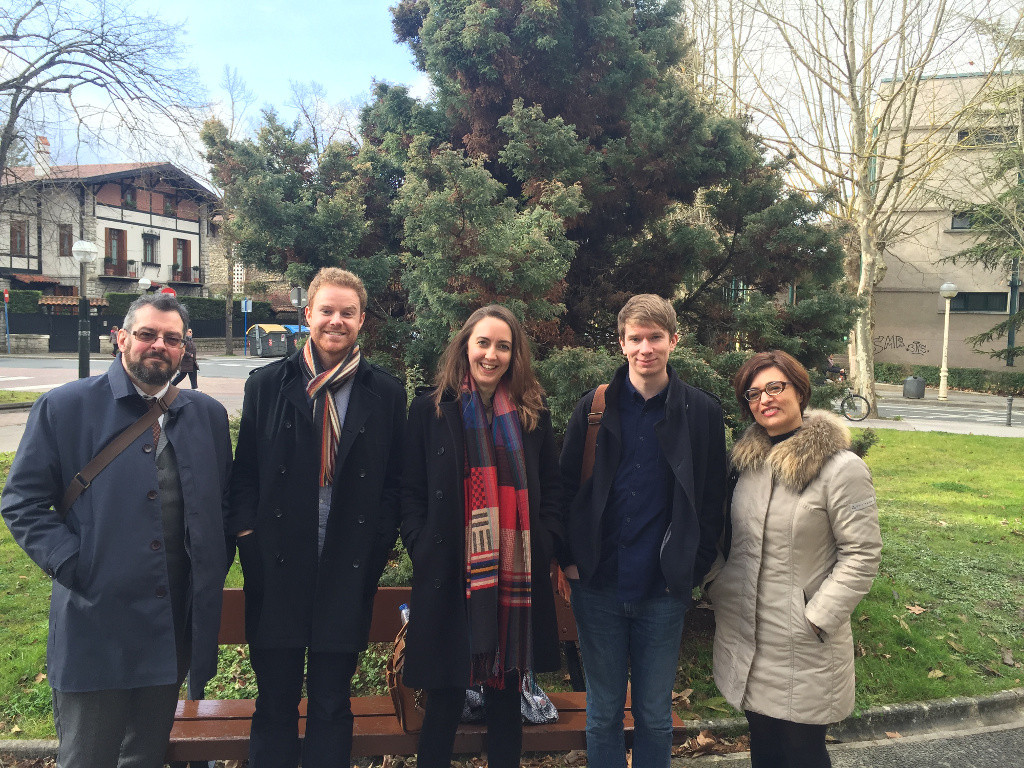
Next week, the project welcomes Professor Dame Janet L. Nelson (London), who will be speaking on ‘Language-use in Charlemagne’s Empire’ (Tuesday, 9 February, 3pm, in Salón de Grados, Facultad de Letras).
Yesterday we welcomed Professor Elizabeth Tyler (University of York) to Vitoria, who delivered a fascinating and wide-ranging lecture on ‘Writing Universal History in Eleventh-Century England: Cotton Tiberius B.I, German Imperial History-writing and Vernacular Lay Literacy’. Professor Tyler explored the production and audiences of an extraordinary historical compendium (Cotton Tiberius B.I) in the context of the turbulent politics of the mid eleventh century, arguing that this book needs to be read as a single, universal history, which should be understood in the broader context of northern French and German imperial historiography. The peculiar English penchant for writing history in the vernacular, along with the presence in Cotton Tiberius B.I of shorter theoretical texts, was a unique means of conceptualizing and localizing universal history.
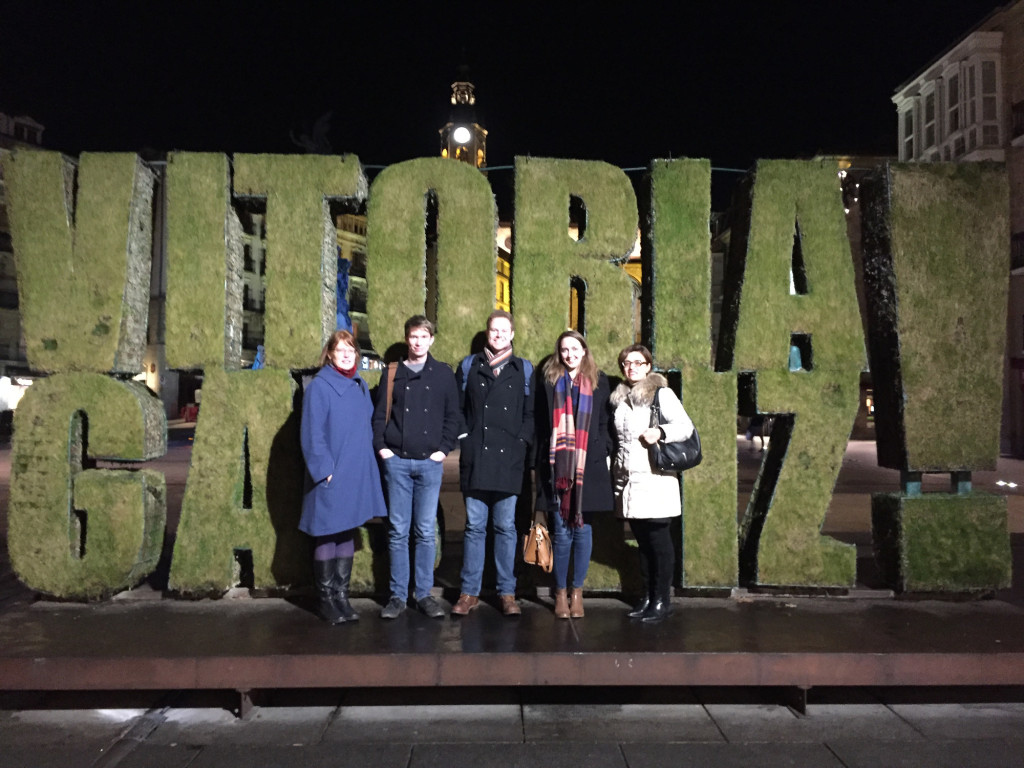
Next week (Wednesday, 27 January), the project welcomes Dr Charles Insley (Manchester), who will be speaking on ‘Languages of Boundaries and Boundaries of Language in Cornish Charters, 900–1100’.
|
|











